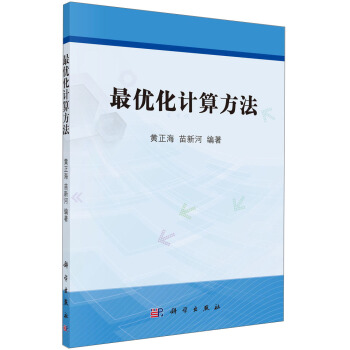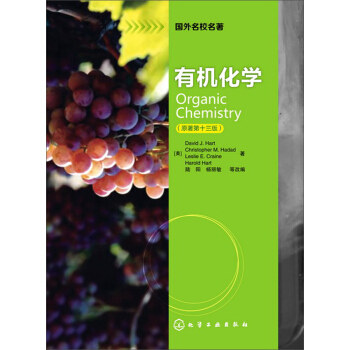

具体描述
编辑推荐
《国外名校名著:有机化学(原著第13版)》可作为医学、药学、护理学、生物学、营养学、农学、林学等专业的教材,对化学及相关专业亦有很好的参考作用。内容简介
《国外名校名著:有机化学(原著第13版)》以尽量简短的篇幅向大家介绍有机化学的全貌,并注意有机化学与医药学等专业的紧密联系。本书的章节组织符合认知规律,在第1章介绍化学键、异构体和有机化合物分类的基础上,顺势引出了饱和、不饱和及芳香族碳氢化合物等三章内容。反应机理的概念引入较早,以便在后面各章反复加强。立体异构现象在第2章和第3章作了简单介绍,然后在第5章进行了专门探讨。第6章含卤有机化合物的介绍作为理解取代反应、消除反应和立体化学动力学的工具。第7~10章按碳的氧化态升高的顺序介绍含氧官能团化合物——醇和酚、醚和环氧化合物、醛和酮、羧酸及其衍生物,它们的含硫类似物也都简单提及。第11章介绍胺类化合物。第2~11章为本书的核心。第12章为波谱学基础,重点介绍核磁共振及其应用。第13、14章介绍了杂环化合物和高聚物。最后四章为脂类,糖类,氨基酸、肽和蛋白质,核酸等重要生物物质的介绍。目录
Contents
1 Bonding and Isomerism(键合和异构)
1.1 How Electrons Are Arranged in Atoms(原子中的电子排布)
1.2 Ionic and Covalent Bonding(离子键和共价键)
1.3 Carbon and the Covalent Bond(碳原子和共价键)
1.4 Carbon-Carbon Single Bonds(碳-碳单键)
1.5 Polar Covalent Bonds(极性共价键)
1.6 Multiple Covalent Bonds(多重共价键)
1.7 Valence(化合价)
1.8 Isomerism(异构现象)
1.9 Writing Structural Formulas(结构式的书写)
1.10 Abbreviated Structural Formulas(简化结构式)
1.11 Formal Charge(形式电荷)
1.12 Resonance(共振理论)
1.13 Arrow Formalism(箭头形式)
1.14 The Orbital View of Bonding; the Sigma Bond(共价键的轨道理论;σ键)
1.15 Carbon sp3 Hybrid Orbitals(碳的sp3杂化轨道)
1.16 Tetrahedral Carbon; the Bonding in Methane(碳原子的四面体结构;甲烷分子中的碳氢键)
1.17 Classification According to Molecular Framework(按分子骨架分类)
1.18 Classification According to Functional Group(按功能基分类)
2 Alkanes and Cycloalkanes; Conformational and Geometric Isomerism(烷烃和环烷烃;构象和几何异构)
2.1 The Structures of Alkanes(烷烃的结构)
2.2 Nomenclature of Organic Compounds(有机化合物的命名)
2.3 IUPAC Rules for Naming Alkanes(烷烃的IUPAC命名规则)
2.4 Alkyl and Halogen Substituents(烷基和卤素取代基)
2.5 Use of the IUPAC Rules(IUPAC命名规则的应用)
2.6 Sources of Alkanes(烷烃的来源)
2.7 Physical Properties of Alkanes and Nonbonding Intermolecular Interactions(烷烃的物理性质和分子间的非键作用)
2.8 Conformations of Alkanes(烷烃的构象)
2.9 Cycloalkane Nomenclature and Conformation(环烷烃的命名和构象)
2.10 Cis-Trans Isomerism in Cycloalkanes(环烷烃的顺反异构)
2.11 Summary of Isomerism(异构现象小结)
2.12 Reactions of Alkanes(烷烃的化学反应)
2.13 The Free-Radical Chain Mechanism of Halogenation(烷烃卤代的自由基链反应机制)
3 Alkenes and Alkynes(烯烃和炔烃)
3.1 Definition and Classification(定义和分类)
3.2 Nomenclature(命名)
3.3 Some Facts about Double Bonds(碳碳双键的特征)
3.4 The Orbital Model of a Double Bond; the Pi Bond(碳碳双键的轨道模型;π键)
3.5 Cis-Trans Isomerism in Alkenes(烯烃的顺反异构现象)
3.6 Addition and Substitution Reactions Compared(加成和取代反应的比较)
3.7 Polar Addition Reactions(极性加成反应)
3.8 Addition of Unsymmetric Reagents to Unsymmetric Alkenes; Markovnikov‘s Rule(不对称试剂与不对称烯烃的加成;马尔可夫尼可夫规则)
3.9 Mechanism of Electrophilic Addition to Alkenes(烯烃的亲电加成机制)
3.10 Markovnikov’s Rule Explained(马尔可夫尼可夫规则的解释)
3.11 Reaction Equilibrium: What Makes a Reaction Go?(反应平衡:什么使反应能够进行下去?)
3.12 Reaction Rates: How Fast Does a Reaction Go?(反应速率:反应进行得有多快?)
3.13 Hydroboration of Alkenes(烯烃的硼氢化反应)
3.14 Addition of Hydrogen(加氢反应)
3.15 Additions to Conjugated Systems(共轭烯烃的加成反应)
3.16 Free-Radical Additions; Polyethylene(自由基加成反应;聚乙烯)
3.17 Oxidation of Alkenes(烯烃的氧化)
3.18 Some Facts about Triple Bonds(叁键的特征)
3.19 The Orbital Model of a Triple Bond(叁键的轨道模型)
3.20 Addition Reactions of Alkynes(炔烃的加成反应)
3.21 Acidity of Alkynes(炔烃的酸性)
4 Aromatic Compounds(芳香化合物)
4.1 Some Facts about Benzene(有关苯的实验事实)
4.2 The Kekulé Structure of Benzene(苯的凯库勒结构式)
4.3 Resonance Model for Benzene(苯的共振结构模型)
4.4 Orbital Model for Benzene(苯的轨道模型)
4.5 Symbols for Benzene(苯的结构表达式)
4.6 Nomenclature of Aromatic Compounds(芳香族化合物的命名)
4.7 The Resonance Energy of Benzene(苯的共振能)
4.8 Electrophilic Aromatic Substitution(芳香亲电取代反应)
4.9 The Mechanism of Electrophilic Aromatic Substitution(芳香亲电取代反应的机制)
4.10 Ring-Activating and Ring-Deactivating Substituents(苯环的活化基和钝化基)
4.11 Ortho,Para-Directing and Meta-Directing Groups(邻,对位定位基和间位定位基)
4.12 The Importance of Directing Effects in Synthesis(定位效应在合成中的重要性)
4.13 Polycyclic Aromatic Hydrocarbons(多环芳香烃)
5 Stereoisomerism(立体异构)
5.1 Chirality and Enantiomers(手性和对映异构体)
5.2 Stereogenic Centers; the Stereogenic Carbon Atom(手性中心;手性碳原子)
5.3 Configuration and the R-S Convention(R-S 构型)
5.4 Polarized Light and Optical Activity(偏振光和光学活性)
5.5 Properties of Enantiomers(对映异构体的性质)
5.6 Fischer Projection Formulas(费歇尔投影式)
5.7 Compounds with More Than One Stereogenic Center; Diastereomers(具有多个手性中心的化合物;非对映异构体)
5.8 Meso Compounds; the Stereoisomers of Tartaric Acid(内消旋化合物;酒石酸的立体异构体)
5.9 Stereochemistry: A Recap of Definitions(立体化学:定义概述)
5.10 Stereochemistry and Chemical Reactions(立体化学和化学反应)
5.11 Resolution of a Racemic Mixture(外消旋体的拆分)
6 Organic Halogen Compounds; Substitution and Elimination Reactions(含卤有机化合物;取代反应和消除反应)
6.1 Nucleophilic Substitution(亲核取代反应)
6.2 Examples of Nucleophilic Substitutions(亲核取代反应实例)
6.3 Nucleophilic Substitution Mechanisms(亲核取代反应机制)
6.4 The SN2 Mechanism(双分子亲核取代机制)
6.5 The SN1 Mechanism(单分子亲核取代机制)
6.6 The SN1 and SN2 Mechanisms Compared(SN1和SN2反应机制的比较)
6.7 Dehydrohalogenation, an Elimination Reaction; the E2 and E1 Mechanisms(脱卤化氢,消除反应;双分子消除和单分子消除机制)
6.8 Substitution and Elimination in Competition(取代反应和消除反应的相互竞争)
6.9 Polyhalogenated Aliphatic Compounds(多卤代脂肪烃)
7 Alcohols, Phenols, and Thiols(醇,酚和硫醇)
7.1 Nomenclature of Alcohols(醇的命名)
7.2 Classification of Alcohols(醇的分类)
7.3 Nomenclature of Phenols(酚的命名)
7.4 Hydrogen Bonding in Alcohols and Phenols(醇和酚分子中的氢键)
7.5 Acidity and Basicity Reviewed(酸性和碱性)
7.6 The Acidity of Alcohols and Phenols(醇和酚的酸性)
7.7 The Basicity of Alcohols and Phenols(醇和酚的碱性)
7.8 Dehydration of Alcohols to Alkenes(醇脱水生成烯烃的反应)
7.9 The Reaction of Alcohols with Hydrogen Halides(醇与卤化氢的反应)
7.10 Other Ways to Prepare Alkyl Halides from Alcohols(由醇制备卤代烃的方法)
7.11 A Comparison of Alcohols and Phenols(醇和酚的比较)
7.12 Oxidation of Alcohols to Aldehydes, Ketones, and Carboxylic Acids(醇的氧化反应--生成醛,酮和羧酸)
7.13 Alcohols with More Than One Hydroxyl Group(多元醇)
7.14 Aromatic Substitution in Phenols(酚的芳香取代反应)
7.15 Oxidation of Phenols(酚的氧化反应)
7.16 Phenols as Antioxidants(酚类抗氧化剂)
7.17 Tests for Phenols(酚的鉴别)
7.18 Thiols, the Sulfur Analogs of Alcohols and Phenols(硫醇,醇和酚的硫类似物)
8 Ethers and Epoxides(醚和环氧化合物)
8.1 Nomenclature of Ethers(醚的命名)
8.2 Physical Properties of Ethers(醚的物理性质)
8.3 Ethers as Solvents(醚作溶剂)
8.4 The Grignard Reagent; an Organometallic Compound(格利雅试剂;一种有机金属化合物)
8.5 Preparation of Ethers(醚的制备)
8.6 Cleavage of Ethers(醚的裂解)
8.7 Epoxides (Oxiranes)[环氧化物(环氧乙烷)]
8.8 Reactions of Epoxides(环氧化物的反应)
8.9 Cyclic Ethers(环醚)
9 Aldehydes and Ketones(醛和酮)
9.1 Nomenclature of Aldehydes and Ketones(醛和酮的命名)
9.2 Some Common Aldehydes and Ketones(常见的醛和酮)
9.3 Synthesis of Aldehydes and Ketones(醛和酮的制备)
9.4 Aldehydes and Ketones in Nature(天然醛酮)
9.5 The Carbonyl Group(羰基)
9.6 Nucleophilic Addition to Carbonyl Groups: An Overview(羰基的亲核加成:概述)
9.7 Addition of Alcohols: Formation of Hemiacetals and Acetals(与醇加成:生成半缩醛和缩醛)
9.8 Addition of Water; Hydration of Aldehydes and Ketones(与水加成:醛酮的水合)
9.9 Addition of Grignard Reagents and Acetylides(与Grignard试剂和炔化物加成)
9.10 Addition of Hydrogen Cyanide; Cyanohydrins(与氢氰酸加成:生成氰醇)
9.11 Addition of Nitrogen Nucleophiles(与含氮亲核试剂加成)
9.12 Reduction of Carbonyl Compounds(羰基化合物的还原)
9.13 Oxidation of Carbonyl Compounds(羰基化合物的氧化)
9.14 Keto-Enol Tautomerism(酮式-烯醇式互变异构)
9.15 Acidity of a-Hydrogens; the Enolate Anion(a-氢的酸性;烯醇负离子)
9.16 Deuterium Exchange in Carbonyl Compounds(羰基化合物的氘代)
9.17 Halogenation(卤代反应)
9.18 The Aldol Condensation(醇醛缩合反应)
9.19 The Mixed Aldol Condensation(混合醇醛缩合)
9.20 Commercial Syntheses via the Aldol Condensation(醇醛缩合反应在合成中的应用)
10 Carboxylic Acids and Their Derivatives(羧酸及其衍生物)
10.1 Nomenclature of Acids(羧酸的命名)
10.2 Physical Properties of Acids(羧酸的物理性质)
10.3 Acidity and Acidity Constants(酸性和酸度常数)
10.4 What Makes Carboxylic Acids Acidic?(羧酸的酸性基)
10.5 Effect of Structure on Acidity; the Inductive Effect Revisited(羧酸的结构对酸性的影响;诱导效应的影响)
10.6 Conversion of Acids to Salts(成盐反应)
10.7 Preparation of Acids(羧酸的制备)
10.8 Decarboxylation(脱羧反应)
10.9 Carboxylic Acid Derivatives(羧酸衍生物)
10.10 Esters(酯)
10.11 Preparation of Esters; Fischer Esterification(酯的制备;Fischer酯化反应)
10.12 The Mechanism of Acid-Catalyzed Esterification; Nucleophilic Acyl Substitution(酸催化酯化反应机制;酰基的亲核取代)
10.13 Lactones(内酯)
10.14 Saponification of Esters(酯的皂化反应)
10.15 Ammonolysis of Esters(酯的氨解)
10.16 Reaction of Esters with Grignard Reagents(酯与格利雅试剂的反应)
10.17 Reduction of Esters(酯的还原)
10.18 The Need for Activated Acyl Compounds(酰基化合物活性的影响因素)
10.19 Acyl Halides(酰卤)
10.20 Acid Anhydrides(酸酐)
10.21 Amides(酰胺)
10.22 A Summary of Carboxylic Acid Derivatives(羧酸衍生物小结)
10.23 The a-Hydrogen of Esters; the Claisen Condensation(酯的a-氢;Claisen缩合)
11 Amines and Related Nitrogen Compounds(胺和相关含氮化合物)
11.1 Classification and Structure of Amines(胺的结构和分类)
11.2 Nomenclature of Amines(胺的命名)
11.3 Physical Properties and Intermolecular Interactions of Amines(胺的物理性质和分子间相互作用)
11.4 Preparation of Amines; Alkylation of Ammonia and Amines(胺的制备;氨和胺的烷基化)
11.5 Preparation of Amines; Reduction of Nitrogen Compounds(胺的制备;含氮化合物的还原)
11.6 The Basicity of Amines(胺的碱性)
11.7 Comparison of the Basicity and Acidity of Amines and Amides(胺和酰胺的酸碱性比较)
11.8 Reaction of Amines with Strong Acids; Amine Salts(胺与强酸的反应;胺盐)
11.9 Chiral Amines as Resolving Agents(手性胺作为拆分试剂)
11.10 Acylation of Amines with Acid Derivatives(胺与羧酸衍生物的酰化反应)
11.11 Quaternary Ammonium Compounds(季铵化合物)
11.12 Aromatic Diazonium Compounds(芳香重氮化合物)
11.13 Diazo Coupling; Azo Dyes(重氮偶联反应;偶氮染料)
12 Spectroscopy and Structure Determination(波谱学和结构测定)
12.1 Principles of Spectroscopy(波谱学原理)
12.2 Nuclear Magnetic Resonance Spectroscopy(核磁共振波谱)
12.3 13C NMR Spectroscopy(13C NMR谱)
12.4 Infrared Spectroscopy(红外光谱)
12.5 Visible and Ultraviolet Spectroscopy(紫外-可见光谱)
12.6 Mass Spectrometry(质谱)
13 Heterocyclic Compounds(杂环化合物)
13.1 Pyridine: Bonding and Basicity(吡啶:结构和碱性)
13.2 Substitution in Pyridine(吡啶的取代反应)
13.3 Other Six-Membered Heterocycles(其他六元杂环)
13.4 Five-Membered Heterocycles: Furan, Pyrrole, and Thiophene(五元杂环:呋喃,吡咯和噻吩)
13.5 Electrophilic Substitution in Furan, Pyrrole, and Thiophene(呋喃,吡咯和噻吩的亲电取代反应)
13.6 Other Five-Membered Heterocycles: Azoles(其他五元杂环;唑类)
13.7 Fused-Ring Five-Membered Heterocycles: Indoles and Purines(稠环类五元杂环:吲哚和嘌呤)
14 Synthetic Polymers(合成高聚物)
14.1 Classification of Polymers(高聚物的分类)
14.2 Free-Radical Chain-Growth Polymerization(自由基链增长聚合)
14.3 Cationic Chain-Growth Polymerization(阳离子链增长聚合)
14.4 Anionic Chain-Growth Polymerization(阴离子链增长聚合)
14.5 Stereoregular Polymers; Ziegler-Natta Polymerization(有规立构高聚物;齐格勒-纳塔聚合)
14.6 Diene Polymers: Natural and Synthetic Rubber(二烯高聚物:天然橡胶和合成橡胶)
14.7 Copolymers(共聚物)
14.8 Step-Growth Polymerization: Dacron and Nylon(逐步增长聚合:涤纶和尼龙)
14.9 Other Step-Growth Polymers(其他逐步增长聚合物)
15 Lipids and Detergents(脂类和洗涤剂)
15.1 Fats and Oils; Triesters of Glycerol(油脂;甘油三酯)
15.2 Hydrogenation of Vegetable Oils(植物油的氢化反应)
15.3 Saponification of Fats and Oils; Soap(油脂的皂化反应;肥皂)
15.4 How Do Soaps Work?(肥皂如何去污?)
15.5 Synthetic Detergents (Syndets)(人工合成洗涤剂)
15.6 Phospholipids(磷脂)
15.7 Prostaglandins, Leukotrienes, and Lipoxins(前列腺素,白三烯和脂氧素)
15.8 Waxes(蜡)
15.9 Terpenes and Steroids(萜类和甾体化合物)
16 Carbohydrates(糖类)
16.1 Definitions and Classification(糖的定义和分类)
16.2 Monosaccharides(单糖)
16.3 Chirality in Monosaccharides; Fischer Projection Formulas and D, L-Sugars(单糖的手性;Fischer投影式和D,L-型糖)
16.4 The Cyclic Hemiacetal Structures of Monosaccharides(单糖的环状半缩醛结构)
16.5 Anomeric Carbons; Mutarotation(异头碳;变旋光现象)
16.6 Pyranose and Furanose Structures(吡喃糖和呋喃糖的结构)
16.7 Conformations of Pyranoses(吡喃糖的构象)
16.8 Esters and Ethers from Monosaccharides(单糖的成酯和成醚反应)
16.9 Reduction of Monosaccharides(单糖的还原)
16.10 Oxidation of Monosaccharides(单糖的氧化)
16.11 Formation of Glycosides from Monosaccharides(单糖的成苷反应)
16.12 Disaccharides(双糖)
16.13 Polysaccharides(多糖)
16.14 Sugar Phosphates(糖的磷酸酯)
16.15 Deoxy Sugars(脱氧糖)
16.16 Amino Sugars(氨基糖)
16.17 Ascorbic Acid (Vitamin C)[抗坏血酸(维生素C)]
17 Amino Acids, Peptides, and Proteins(氨基酸,肽和蛋白质)
17.1 Naturally Occurring Amino Acids(天然氨基酸)
17.2 The Acid-Base Properties of Amino Acids(氨基酸的酸碱性)
17.3 The Acid-Base Properties of Amino Acids with More Than One Acidic or Basic Group(含有多个酸性或碱性基团氨基酸的酸碱性)
17.4 Electrophoresis(电泳)
17.5 Reactions of Amino Acids(氨基酸的反应)
17.6 The Ninhydrin Reaction(茚三酮反应)
17.7 Peptides(肽)
17.8 The Disulfide Bond(二硫键)
17.9 Proteins(蛋白质)
17.10 The Primary Structure of Proteins(蛋白质的一级结构)
17.11 The Logic of Sequence Determination(序列测定的推理方法)
17.12 Secondary Structure of Proteins(蛋白质的二级结构)
17.13 Tertiary Structure: Fibrous and Globular Proteins(三级结构:纤维蛋白和球蛋白)
17.14 Quaternary Protein Structure(蛋白质的四级结构)
18 Nucleotides and Nucleic Acids(核苷酸和核酸)
18.1 The General Structure of Nucleic Acids(核酸的一般结构)
18.2 Components of Deoxyribonucleic Acid (DNA)(脱氧核糖核酸的组成)
18.3 Nucleosides(核苷)
18.4 Nucleotides(核苷酸)
18.5 The Primary Structure of DNA(DNA的一级结构)
18.6 Sequencing Nucleic Acids(核酸的测序)
18.7 Secondary DNA Structure; the Double Helix(DNA的二级结构;双螺旋结构)
18.8 DNA Replication(DNA复制)
18.9 Ribonucleic Acids; RNA(核糖核酸;RNA)
18.10 The Genetic Code and Protein Biosynthesis(遗传密码和蛋白质的生物合成)
18.11 Other Biologically Important Nucleotides(生物学上其他的重要核苷酸)
前言/序言
用户评价
天哪,最近终于下定决心要啃这本“有机化学巨著”,刚拿到书的那一刻,我的内心是既激动又有点小害怕。封面看起来就很有分量,那种沉甸甸的知识感扑面而来。我之前对有机化学一直处于一种“似懂非懂”的状态,概念总是混淆不清,反应机理更是像一本天书。这次选择的是原著第13版,听说这次更新了很多前沿的知识点和最新的研究成果,这让我对未来的学习充满了期待,同时也暗暗捏了一把汗。
评分拿到这本书的时候,就觉得这绝对是一本值得细细品味的书。我之前也接触过一些有机化学的教材,但总感觉缺了点什么,要么太理论化,要么例子不够生动。这本书的排版和设计我非常喜欢,字体大小适中,图文并茂,很多复杂的化学结构图都画得非常清晰,这一点对于我这种视觉型学习者来说太友好了。而且,感觉这本书的逻辑性很强,知识点的编排循序渐进,不会让人觉得一下子接收太多信息而不知所措。
评分读一本好书,就像找到了一位良师益友。这本书给我的第一印象就是它的权威性和深度。它不仅仅是一本教科书,更像是一本百科全书,里面包含了有机化学的方方面面。我非常欣赏它对概念的严谨定义和对原理的深入剖析,这对于我这种喜欢刨根问底的学习者来说,简直是如获至宝。虽然我知道要完全掌握这本书的内容需要付出巨大的努力,但我相信,这份努力绝对是值得的,它将为我的知识体系打下坚实的基础。
评分买这本书纯属是出于对“名校名著”的好奇心。你知道的,有时候我们会被一些光环效应所吸引,觉得名校出品的东西一定差不了。拿到手之后,我还没来得及深入阅读,只是大概翻了一下目录和前言,就已经被它宏大的框架和细致的讲解所吸引。感觉这本书就像一个庞大的知识宝库,里面隐藏着无数等待我去挖掘的宝藏。我期待着它能带领我进入一个全新的知识领域,开拓我的视野,让我对这个世界有更深刻的理解。
评分我一直对科学史充满了好奇,这本书虽然是讲有机化学的,但在阅读的过程中,我偶尔会联想到一些伟大的化学家和他们的发现。想象一下,那些在实验室里,日复一日,年复一年地探索未知世界的科学家们,他们的智慧和毅力是如何塑造了我们今天所了解的有机化学。这本书让我不仅仅是在学习化学分子和反应,更是在与这些历史的进程对话,这种感觉非常奇妙,也让我对化学这门学科有了更深层次的敬畏。
评分她写了日本有史以来销量最大的一本书,33种文字全球发行,拥有读者数千万;
评分主要都是英文,还要查字典,整体蛮好
评分她写了日本有史以来销量最大的一本书,33种文字全球发行,拥有读者数千万;
评分她写了日本有史以来销量最大的一本书,33种文字全球发行,拥有读者数千万;
评分书不错
评分商品描述相符,卖家服务态度好,物流发货速度快。
评分纸的质量不怎么好。不过学习专业课,也能学习专业的英语词,不错
评分主要都是英文,还要查字典,整体蛮好
评分这本书记录了她来到新学校后的一段真实时光,这段时光奠定了她辉煌一生的基础。
相关图书
本站所有内容均为互联网搜索引擎提供的公开搜索信息,本站不存储任何数据与内容,任何内容与数据均与本站无关,如有需要请联系相关搜索引擎包括但不限于百度,google,bing,sogou 等,本站所有链接都为正版商品购买链接。
© 2026 windowsfront.com All Rights Reserved. 静流书站 版权所有

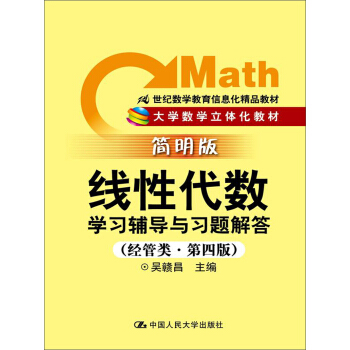
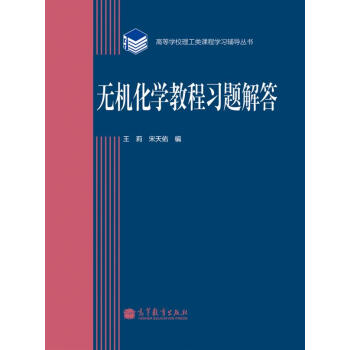
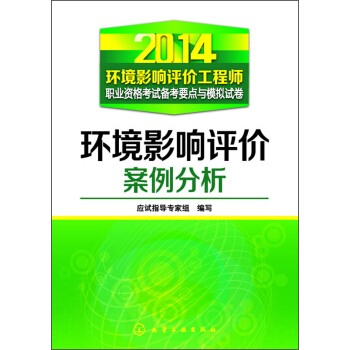
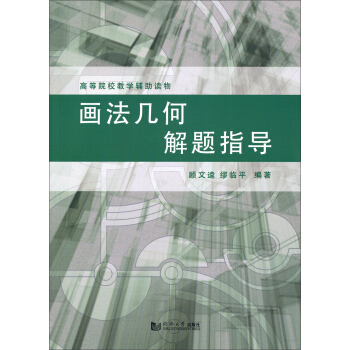
![软界面:1994年狄拉克纪念讲演录 [Soft Interfaces the 1994 Dirac Memorial Lecture] pdf epub mobi 电子书 下载](https://pic.windowsfront.com/11402078/564150e1N7e33382e.jpg)
![大学物理学(上册) [University Physics (Volume I)] pdf epub mobi 电子书 下载](https://pic.windowsfront.com/11404521/563c1aa0Na9c56009.jpg)
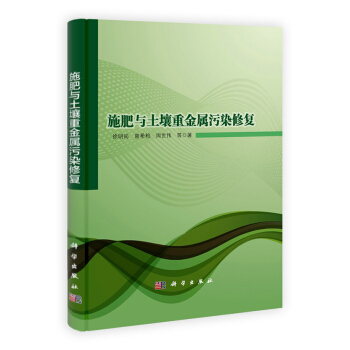
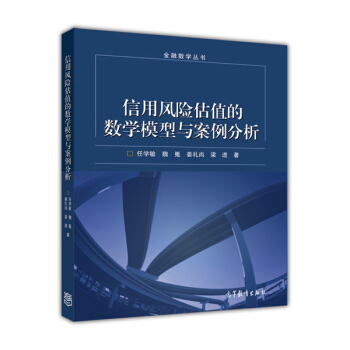
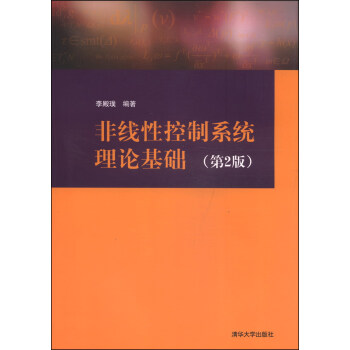
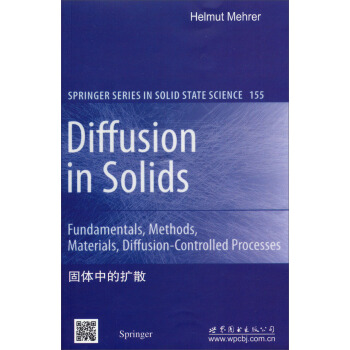

![航天科学与工程专著系列:三维编织复合材料力学性能分析方法 [Mechanical Analysis Method of 3D Braided Composites] pdf epub mobi 电子书 下载](https://pic.windowsfront.com/11468133/5397a46fNaf15797c.jpg)
![国际环境译丛(第一辑):荒野与美国思想 [Wilderness & The American Mind] pdf epub mobi 电子书 下载](https://pic.windowsfront.com/11507624/53e76825N5c62dd96.jpg)
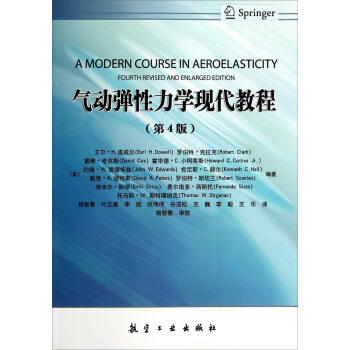

![实变函数(第二版)/高等学校教材 [Function of Real Variable] pdf epub mobi 电子书 下载](https://pic.windowsfront.com/11533560/5652a6beNf7e2931e.jpg)

![鲁棒控制理论教程 [A Course in Robust Control Theory] pdf epub mobi 电子书 下载](https://pic.windowsfront.com/11582545/54744a75N6bc18d14.jpg)
